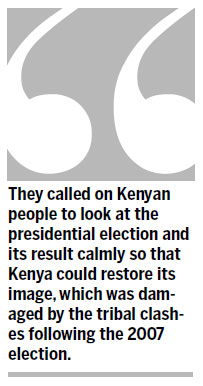Kenya's peaceful election
Updated: 2013-03-21 07:12
By He Wenping (China Daily)
|
||||||||

Constitutional changes and balance of power contribute to political maturity and progress in presidential vote
Despite growing uncertainties involving a petition filed by Kenyan Prime Minister Raila Odinga asking the Supreme Court to void the presidential election a week after Kenya's electoral commission declared Uhuru Kenyatta the winner of the March 4 vote, the peaceful conclusion of the presidential election marks a heartening and praiseworthy political event in the east African nation.
Before the election, the international community had been highly concerned about the possibility of violence breaking out after the elections. The result of the 2007 presidential election sparked six weeks of violence and tribal bloodshed in Kenya, more than 1,200 people died and hundreds of thousands more were left homeless. After intensive mediations from the international community, including former United Nations secretary-general Kofi Annan, and the efforts of various social circles in Kenya, its two major political parties finally reached a compromise and established a coalition government.
This time the contest was primarily between Odigna, the candidate for the Coalition for Reforms and Democracy, and Kenyatta, the deputy prime minister and candidate for the Jubilee Coalition, although there were six other candidates. The contest between Odigna and Kenyatta, son of Jomo Kenyatta, Kenya's founding father, was to some extent a power struggle between the Luo tribe, the third-largest, and the Kikuyu, the largest. Before the election, Kenya's various social circles made unremitting efforts to avoid any repetition of the 2007 violence. They called on Kenyan people to look at the presidential election and its result calmly so that Kenya could restore its image, which was damaged by the tribal clashes following the 2007 election.
Such efforts were not in vain. When the Kenyan electoral commission announced on March 9 that Kenyatta had won with 50.7 percent of the votes, there was no widespread violence. Although the defeated Odigna has complained of widespread irregularities in the election process and he has filed a legal challenge, he still called for supporters to be calm, saying any violent conflicts will lead the country to destruction.
Aside from the efforts of its various social circles and political leaders to maintain peace, that the election passed off peacefully can also be attributed to the establishment of a more democratic political system since 2007. Kenya has been working to uproot the previous sources of violence from the perspective of institutional improvements. It promulgated a new constitution in 2010 aimed at decentralizing the central government and promoting a power balance. The old constitution bestowed the president with excessive concentration of power. This winner- takes-all power model encouraged hatred among the different political factions and triggered large-scale tribal violence and conflicts.
Different from the old constitution, the new one is aimed at reducing the president's power through striking a power balance among government departments. Kenya's Supreme Court and its Senate established under the new constitution have also helped restrict the power of the Cabinet and the president. In a bid to realize a fairer distribution of its resources, the new constitution has moved some power from central government departments to local governments.
According to the constitution, if no presidential candidate gains a majority above 50 percent or more than 25 percent of the votes in 24 of the country's 47 constituencies, a run-off will be held. In the latest election, Odinga came in second in the eight-candidate field with 43 percent of the votes. He had hoped to keep Kenyatta under the 50 percent mark and force a two-man runoff. But Kenyatta won by a hair, with 50.07 percent votes, scraping past the 50 percent mark by about 8,000 votes.
Political developments in Kenya and other African countries indicate that the continent's fledgling democratic politics faces challenges from its underdeveloped market economy, ethnic-based politics and traditional cultures. The "winner takes all" model and the limited resources usually trigger irregularities, malpractices and even conflicts in the process of political elections. But Kenya's peaceful presidential election still marks a step toward political maturity and progress in the African continent.
The author is a researcher at the Institute of West Asian and African Studies, affiliated to the Chinese Academy of Social Sciences.
(China Daily 03/21/2013 page8)

 In Photos: 7.0-magnitude quake hits Sichuan
In Photos: 7.0-magnitude quake hits Sichuan
 Li Na on Time cover, makes influential 100 list
Li Na on Time cover, makes influential 100 list
 FBI releases photos of 2 Boston bombings suspects
FBI releases photos of 2 Boston bombings suspects
 World's wackiest hairstyles
World's wackiest hairstyles
 Sandstorms strike Northwest China
Sandstorms strike Northwest China
 Never-seen photos of Madonna on display
Never-seen photos of Madonna on display
 H7N9 outbreak linked to waterfowl migration
H7N9 outbreak linked to waterfowl migration
 Dozens feared dead in Texas plant blast
Dozens feared dead in Texas plant blast
Most Viewed
Editor's Picks

|

|

|

|

|

|
Today's Top News
Live report: 7.0-magnitude quake hits Sichuan, heavy casualties feared
Boston suspect cornered on boat
Cross-talk artist helps to spread the word
'Green' awareness levels drop in Beijing
Palace Museum spruces up
First couple on Time's list of most influential
H7N9 flu transmission studied
Trading channels 'need to broaden'
US Weekly

|

|







